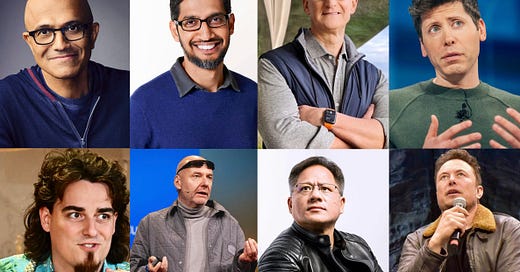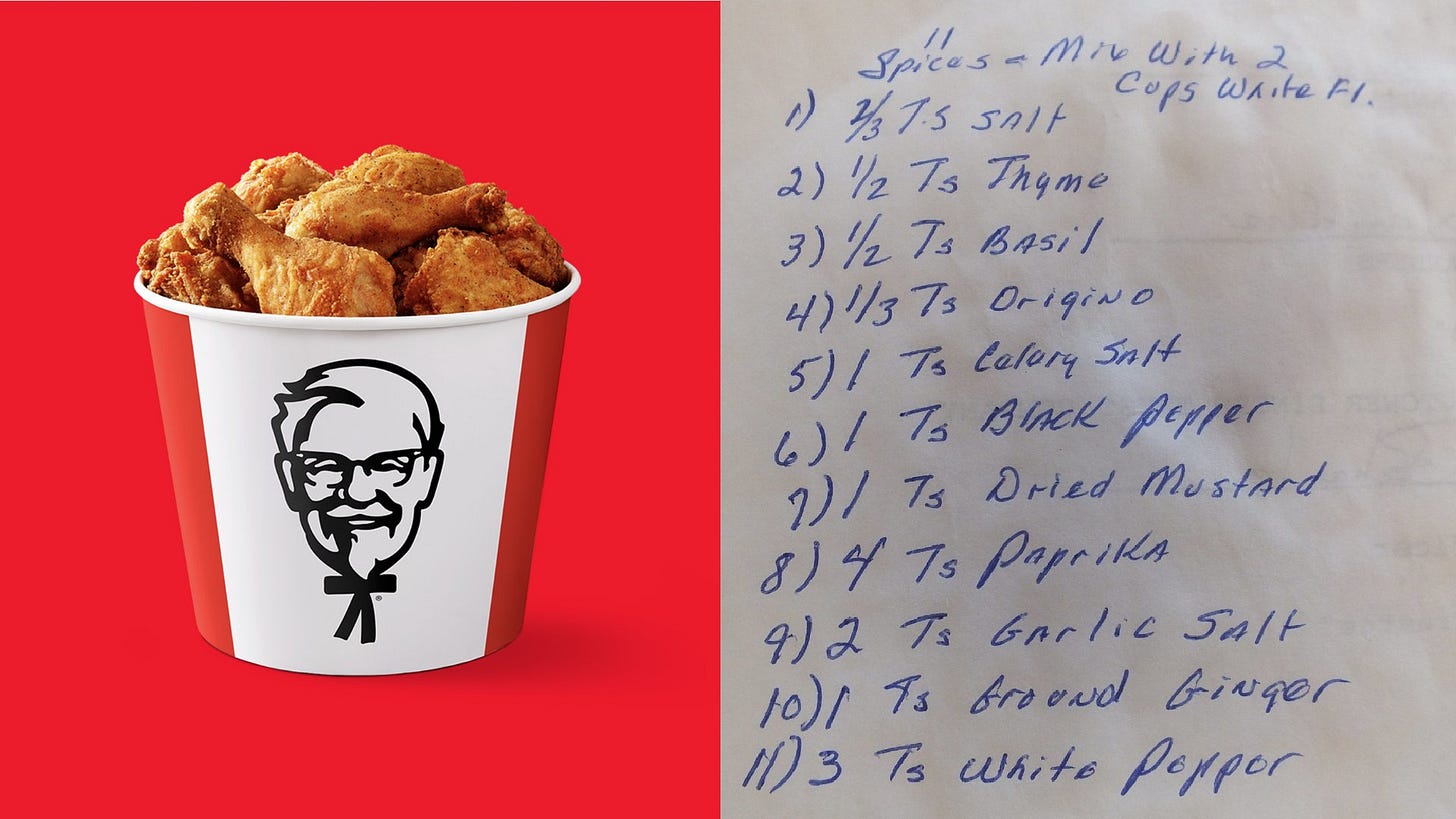Hello again… Glad you are here.
Let’s try something different. Below are this week’s five topics, all discussed in more detail on your favorite People vs Algorithm’s podcast (out every Friday morning). Now and then, we will include longer missives. Tell us what you think and thanks for reading!
Troy Young, Brian Morrissey, Alex Schleifer
1. Cashmere qubits
Troy: It should be pretty clear by now that the American economy is just The Global Tech Economy. Tech used to be the Bay Area, home to a handful of powerful platforms and chip companies. Then software ate the world. Tech ate the markets. Tech became central to every meaningful sector. Tech is media. Tech is transportation. Tech is healthcare. Tech is finance. Tech is fast becoming the defense biz. Tech is global power. Now, tech is coming for the US government.
That power has a look:
With its ascendancy comes undeniable influence of the American (mostly male) aesthetic. Fast casual is the business power expression du jour. Preferably in cashmere. Especially nice when draping a tech-optimized jacked bod. But casual needs a twist. Rule breakers cannot look like an Everlane ad. For better of worse, the iconoclasts have embraced their own signature fashion quirks (Hawaiian shirt, cyborg sunglasses, aviator / biker jacket, Loro Piana everything, big ass Texas belt buckle, Moncler ball cap, secret message t-shirts, chain with power message pendant). Layering a tousled presentation is a further rejection of convention.

While the service class (see bankers, lawyers) suit up, their tech capital owning overlords seeks to let the freak fly, albeit with maximum comfort and maneuverability. The suit and tie has become the McDonald’s uniform equivalent for legal, financial and bureaucratic domestics.
What happens next? Does power go full casual? Does Washington dress down… or will politics force tech to suit up?
And speaking of tech power, if there’s one thing that will fuel the next wave of populist upheaval its this… regular people’s understanding of powerful frontier tech, the stuff that will fundamentally change how will live and who has all the power, is incomprehensible to but a few. Maybe… maybe people felt similarly clueless when radio was popularized in the 1920’s or first experienced the wonder of personal computers in the 1980’s. But highly intelligent thinking machines, especially when they grow arms and legs, seem infinitely more disruptive.
I don’t think we are all ready for the future. And that seems dangerous.
Today, the magic inside the machine seems harder to comprehend save for the privileged few. Who in government really gets what’s next?
You can watch today’s tech ensemble perform on YouTube, as I often do. Here, a look-what-we-made earnestness veers toward a grating techno-righteousness (see the 12 days of OpenAI). The high school chess club, on their way to being dumb rich, talking like Steve Jobs: “This is the most powerful model we have ever created. We can’t wait to see what you do with it…” Now it’s coming to reinvent government. Who can resist the promise of efficiency.

Now, I mostly get how a silicon chip scales processing of transistors, turning 0’s and 1’s into the internet and Excel. I understand how code and API’s and memory and networking function. At least conceptually. But quantum computing is around the corner and it’s mind bending.
Google’s new quantum computing chip, Willow, promises to solve complex problems in under five minutes that would take the classical super computers 10 septillion years to complete. What is septillion? A trillion trillions, dummy. What is quantum computing? It has been explained to me a bunch of times but I still don’t really get it. Bits become qubits. Something that can represent 0,1 or both at the same time due to a property called “superposition.” What do you do with this? I guess you map existence at a subatomic level. What does that get you? I am sure something insanely useful.

Big gaps in income, in power, and now, in understanding… create unstable societies. Today, tech elites are wearing power differently. That may make them look more like people at the grocery store. But it’s not gonna counterbalance the inequity it masks as a fundamental underlying knowledge gap widens. Even if it means a robot prepares you breakfast and brings it to you in bed.
Alex: Meanwhile, some tech reporters like Nilay from The Verge are dismissing AI as vaporware. It’s true that much of what Apple and Google has integrated into their OS hasn’t changed life meaningfully BUT the good stuff needs to get built. Those new coding tools are a sign of things to come. As is Google’s agent in Chrome feature which is slow but promising. I think 2025 is when we start seeing some new ideas vs AI slapped onto stuff.
Also, truth is many of the tech leaders don’t fully understand the way the tech is heading. The future is going to be build by people who build new things on top of this technology. New interfaces. New behaviors.
Honorable mentions: Sora’s out, Kanye made a music video with his kids and AI, the Game Awards are on this week — it’s like the Oscar’s but young people watch it. Spotify wrapped is a behemoth.
2. The agency hold co is dead
Troy: Omnicom finally consummates a HoldCo merger 11 years after a failed attempt to merge in Publicis. The combined entity will earn $25B in revenue, employ over 100,000 people and look to squeeze $750M in savings from collective P&L. A crowning achievement for John Wren who co-founded Omnicom and has steered if for almost 40 years ago.
Holding company acquisitions used to largely be about picking up the most coveted creative shops, their talent and clients. Cashing out the madmen.
Now it’s about fortifying the agency value prop against the tech platform onslaught. Modern marketing is managing complex data driven stream of personalized communications. Platform power on the sell side must be met with the same scale and sophistication on the buying end. Combining IPG’s data management capabilities in Acxiom with Omnicom’s media management platform, Omni, together with Flywheel, the recently acquired retail advertising company, should make a more formidable competitive offering. IPG’s creative stuff will get smashed together inside Omnicom Advertising Group.
Profits will come from owning platforms and the once unfashionable discipline of taking primary media positions and selling outcomes.
The HoldCo is different now. It’s a platform and people to operate it. Eponymous agencies like TBWA Chiat Day, remnants of a more romantic agency era.
Brian: Maybe we just fast forward to when there is one ad holding company. I can remember how for years I’d hear Martin Sorrell claim WPP was a peer of Google. Not quite. The massive tech platforms are all becoming outcomes machines powered by AI and vast troves of data. Ad holding companies are relics of a different era. They’re going to try to imitate Google and Facebook by offering outcomes and conveniently grading their own homework.
The losers in all this are going to be employees. That’s where that $750m in cost savings are going to be found. The other losers are clients, but they have put their agencies in impossible positions by shoving zero-margin contracts down their throats. Everyone has to eat. So agencies and holding companies have ceased being agents and become principals. A winner: independents.
3. Can anything save the article page
Brian: My go-to question for publishing executives is whether people are going to hit the back button on their article pages in five years. A lot of media gets overcomplicated, but it comes down to what you make, how you distribute it and how you make money. The article page is clearly not fit for purpose. But it’s the atomic unit of publishing. A couple approaches I find interesting:
At the LA Times, Patrick Soon-Shiong is promising to use some kind of AI tool to detect bias in their articles.
Time is testing AI to enhance reader experience.
Every has an interesting experiment using AI to reimagine how to present a story, allowing readers to go deeper and interact with the content to go deeper
Alex often makes the point that most media will need to be interactive and participatory. The article page is a great place to start in rethinking the core of publishers’ products.
Troy: Article pages are too hard. Alex is right. Do we need AI at page level when it will exist in browser or OS?
4. How an assassin hacked the Information Space
Brian: I wrote this week about how Luigi Magione is a product of the Information Space. Not only does he appear to have waded deeply into the manosphere, but the support he’s received has not come from mainstream media. It’s come from normal people, who are now “the media,” as Elon Musk likes to say. This is a populist time, and the powerful people who have co-opted populism are learning that it cuts both ways, as much as they go back to their endless blame games of mainstream media. Be careful what you wish for. Societies always have currents of discontent bubbling among the majority against the privileged minority. Tapping into those resentments, and weaponizing them, is dangerous business, particularly when the old information gatekeepers have been relentlessly attacked and delegitimized.
Troy: Did x reinstate his account? Yes. My son said he seemed like an interesting guy. Not a strident lefty. A decent Tweeter. Likes games. Perfect character for info space digestion for sure. And this:
5. Eleven herbs and spices
Brian: I had a BLT at Fanelli’s with Troy and a PvA listener who is publisher looking at international expansion. Troy kept pressing him on why his stuff is different: “What’s your 11 special herbs and spices?” That’s the old KFC marketing schtick for the Colonel’s secret recipe. (As an aside, watch this man identify Popeye’s chicken by touch alone.) Everything and everyone needs to figure out their 11 special herbs and spices. This is a problem for many publishers who gave over their strategy to platforms in the scale era. They chased whatever the algorithms wanted, and everyone was receiving the same signals. So they all created basically the same Game of Thrones recaps. To be clear, this is the fault of Google and Facebook, which controlled the distribution of traffic and set the incentives that publishers responded to. The current Google crackdown on “parasitic SEO” is making clear that the rules have changed. The incentives now are to come up with your own secret recipe.
Troy: Nick Shelton was a nice guy. Great to meet him. His business, Broadsheet, seems cool. He got this far without raising money. Maybe you just keep going and everything is fine. It doesn’t feel fine to me. Moving a local Australian media model to the UK or US is gonna be interesting to watch. Many headwinds.







